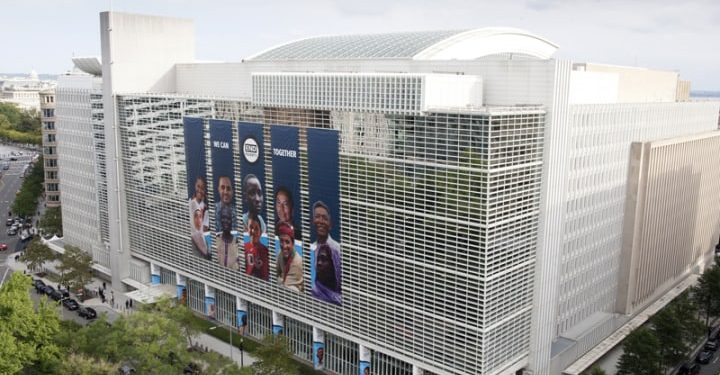World Bank cuts 2022 global growth forecast to 2.9%
Global growth is expected to slump from 5.7% in 2021 to 2.9% in 2022— significantly lower than 4.1% that was anticipated in January, a new World Bank report has said.
It is expected to hover around that pace over 2023-24, as the war in Ukraine disrupts activity, investment, and trade in the near term, pent-up demand fades, and fiscal and monetary policy accommodation is withdrawn.
As a result of the damage from the pandemic and the war, the level of per capita income in developing economies this year will be nearly 5% below its pre-pandemic trend.
According to the World Bank’s latest Global Economic Prospects report, compounding the damage from the COVID-19 pandemic, the Russian invasion of Ukraine has magnified the slowdown in the global economy, which is entering what could become a protracted period of feeble growth and elevated inflation.
This raises the risk of stagflation, with potentially harmful consequences for middle- and low-income economies alike.
“The war in Ukraine, lockdowns in China, supply-chain disruptions, and the risk of stagflation are hammering growth. For many countries, recession will be hard to avoid,” said World Bank President David Malpass.
He added, “Markets look forward, so it is urgent to encourage production and avoid trade restrictions. Changes in fiscal, monetary, climate and debt policy are needed to counter capital misallocation and inequality.”
The June Global Economic Prospects report offers the first systematic assessment of how current global economic conditions compare with the stagflation of the 1970s—with a particular emphasis on how stagflation could affect emerging market and developing economies.
The recovery from the stagflation of the 1970s required steep increases in interest rates in major advanced economies, which played a prominent role in triggering a string of financial crises in emerging market and developing economies.
“Developing economies will have to balance the need to ensure fiscal sustainability with the need to mitigate the effects of today’s overlapping crises on their poorest citizens,” said Ayhan Kose, director of the World Bank’s Prospects Group.
“Communicating monetary policy decisions clearly, leveraging credible monetary policy frameworks, and protecting central bank independence can effectively anchor inflation expectations and reduce the amount of policy tightening required to achieve the desired effects on inflation and activity.”
The current juncture resembles the 1970s in three key aspects: persistent supply-side disturbances fueling inflation, preceded by a protracted period of highly accommodative monetary policy in major advanced economies, prospects for weakening growth, and vulnerabilities that emerging market and developing economies face with respect to the monetary policy tightening that will be needed to rein in inflation.
However, the ongoing episode also differs from the 1970s in multiple dimensions: the dollar is strong, a sharp contrast with its severe weakness in the 1970s; the percentage increases in commodity prices are smaller; and the balance sheets of major financial institutions are generally strong.
More importantly, unlike the 1970s, central banks in advanced economies and many developing economies now have clear mandates for price stability, and, over the past three decades, they have established a credible track record of achieving their inflation targets.
Global inflation is expected to moderate next year but it will likely remain above inflation targets in many economies.
The report notes that if inflation remains elevated, a repeat of the resolution of the earlier stagflation episode could translate into a sharp global downturn along with financial crises in some emerging market and developing economies.
The report also offers fresh insights on how the war’s effects on energy markets are clouding the global growth outlook. The war in Ukraine has led to a surge in prices across a wide range of energy-related commodities.
Higher energy prices will lower real incomes, raise production costs, tighten financial conditions, and constrain macroeconomic policy especially in energy-importing countries.
Growth in advanced economies is projected to sharply decelerate from 5.1% in 2021 to 2.6% in 2022—1.2 percentage point below projections in January. Growth is expected to further moderate to 2.2% in 2023, largely reflecting the further unwinding of the fiscal and monetary policy support provided during the pandemic.
Among emerging market and developing economies, growth is also projected to fall from 6.6% in 2021 to 3.4% in 2022—well below the annual average of 4.8% over 2011-2019. The negative spillovers from the war will more than offset any near-term boost to some commodity exporters from higher energy prices.
Forecasts for 2022 growth have been revised down in nearly 70% of EMDEs, including most commodity importing countries as well as four-fifths of low-income countries.
The report highlights the need for decisive global and national policy action to avert the worst consequences of the war in Ukraine for the global economy. This will involve global efforts to limit the harm to those affected by the war, to cushion the blow from surging oil and food prices, to speed up debt relief, and to expand vaccinations in low-income countries. It will also involve vigorous supply responses at the national level while keeping global commodity markets functioning well.
The report said policymakers, moreover, should refrain from distortionary policies such as price controls, subsidies, and export bans, which could worsen the recent increase in commodity prices.
Against the challenging backdrop of higher inflation, weaker growth, tighter financial conditions, and limited fiscal policy space, governments will need to reprioritize spending toward targeted relief for vulnerable populations.








